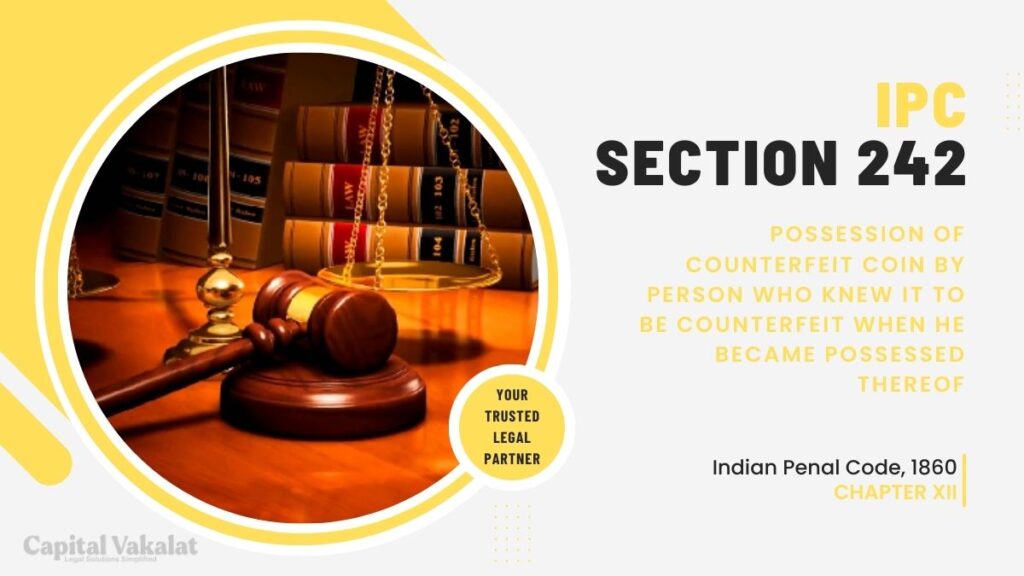Counterfeiting, the act of producing fake currency, has been a criminal offense that governments have sought to combat for centuries. In India, Section 242 of the Indian Penal Code (IPC) deals with the possession of counterfeit coins by individuals who knowingly acquire them.

This article delves into the intricacies of Section 242 IPC, exploring its interpretation, historical context, penalties, defenses, and its impact on society.
Introduction
Counterfeit coin possession may seem like a relatively minor offense compared to other financial crimes. However, it carries significant legal ramifications. Section 242 IPC addresses this issue by making it a punishable offense for individuals who knowingly possess counterfeit coins. This provision aims to protect the integrity of the monetary system and maintain public trust in currency.
Understanding Section 242 IPC
Section 242 IPC is a concise but crucial piece of legislation that makes it illegal for individuals to possess counterfeit coins with the knowledge that they are counterfeit. To fully comprehend this section, one must explore its elements and how it operates within the legal framework.
The Historical Context
To appreciate the importance of Section 242 IPC, it is essential to examine its historical roots. Counterfeit coinage has plagued economies for centuries, leading to the introduction of laws to combat the problem. Understanding the historical context sheds light on the necessity of such legislation.
Proving Knowledge of Counterfeit Coin
For a conviction under Section 242 IPC, the prosecution must establish that the accused possessed counterfeit coins with full knowledge of their falsity. This can be a complex legal challenge, and we’ll delve into how the burden of proof falls on the prosecution and the steps taken to establish the accused’s knowledge.
Punishments and Penalties
The penalties for violating Section 242 IPC are significant and vary based on the circumstances of the case. We’ll explore the legal consequences that individuals face when found guilty of knowingly possessing counterfeit coins, along with real-life case examples.
Defenses against Section 242 IPC
While the law is clear about the offense, there are defenses available to those accused under Section 242 IPC. These defenses may revolve around the intent and knowledge of the accused. Understanding the possible defenses is essential to provide a balanced view of the legal process.
Challenges in Enforcement
Enforcing Section 242 IPC is not without its challenges. The difficulties in prosecuting such cases, including the need for evidence of knowledge, can complicate the legal process. Additionally, the emergence of modern technology presents new challenges in combating counterfeit coinage.
International Perspective
It’s not just India that grapples with the issue of counterfeit coinage. Other countries also have laws and regulations in place to address this problem. Examining the international perspective offers a broader view of how this issue is tackled globally.
Impact on Society
The possession of counterfeit coins might seem like a victimless crime, but its consequences ripple through society. This section explores the broader implications of counterfeit coin possession, from its economic impact to its effects on public trust in currency.
Conclusion
In conclusion, Section 242 IPC plays a crucial role in upholding the integrity of the monetary system and preserving public confidence in currency. While the offense may seem minor, its impact is far-reaching, and its enforcement is essential for a robust financial system.
Frequently Asked Questions
How is knowledge of counterfeit coins proven in court?
The burden of proof falls on the prosecution to establish that the accused knowingly possessed counterfeit coins.
What are the penalties for violating Section 242 IPC?
Penalties vary but can be significant, including imprisonment and fines, depending on the circumstances.
Are there any defenses against Section 242 IPC charges?
Yes, there are defenses, often revolving around intent and knowledge.
How does counterfeit coin possession affect society?
Counterfeit coin possession can impact the economy and erode public trust in currency, leading to broader social consequences.